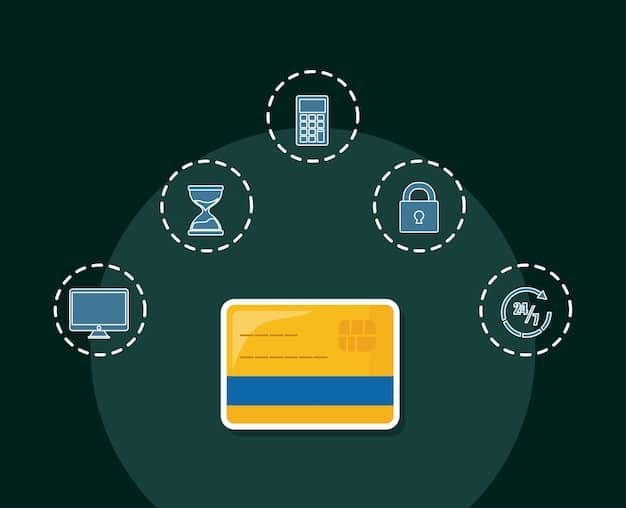Cryptocurrency Credit Cards: US Availability, Benefits & Risks

Cryptocurrency-backed credit cards offer a unique blend of traditional credit card benefits and cryptocurrency rewards, allowing US users to earn crypto on everyday purchases while also navigating potential risks such as volatility and regulatory uncertainty.
Interested in crypto credit cards? These cards allow US users to earn cryptocurrency rewards on purchases. Let’s explore the availability, advantages, and potential pitfalls of cryptocurrency-backed credit cards in the US market to help you make an informed decision.
Understanding Cryptocurrency-Backed Credit Cards
Cryptocurrency-backed credit cards are a novel financial product that combines the features of traditional credit cards with the allure of the cryptocurrency market. These cards allow users to earn rewards in the form of cryptocurrencies, such as Bitcoin or Ethereum, for their everyday spending.
Unlike traditional cashback or rewards points, crypto rewards offer the potential for significant value appreciation if the cryptocurrency’s value increases. However, this also comes with the risk of value depreciation due to the volatile nature of the crypto market.
How do Cryptocurrency-Backed Credit Cards work?
These cards function similarly to regular credit cards. Users make purchases, accumulate a balance, and then pay it off either in full or over time. The key difference lies in the rewards program, which is denominated in cryptocurrency.
When a user earns rewards, the equivalent amount in cryptocurrency is typically deposited into a linked crypto wallet. From there, the user can choose to hold the crypto, trade it, or convert it into fiat currency.
Key Features to Consider
When evaluating cryptocurrency-backed credit cards, several features require close attention. These include:
- Reward Rates: The percentage of each purchase awarded in cryptocurrency.
- Cryptocurrency Options: The types of cryptocurrencies available for rewards.
- Fees: Annual fees, transaction fees, and other associated costs.
- Security Measures: Protection against fraud and unauthorized access to your crypto wallet.
Cryptocurrency-backed credit cards offer an innovative way to engage with the crypto market while enjoying the convenience of a credit card. However, it’s essential to understand how these cards work and what to consider before applying.
Availability of Crypto Credit Cards in the US
The availability of cryptocurrency-backed credit cards in the US is still evolving, but several options have emerged in recent years. These cards are offered by a mix of both traditional financial institutions and companies specializing in cryptocurrency products.
It’s important to note that the landscape is constantly changing, with new cards being introduced and existing ones potentially being discontinued. Therefore, it’s crucial to stay informed about the latest offerings.
Major Players in the US Market
Several companies have already made strides in offering crypto credit cards to US consumers. These include:
- BlockFi Rewards Visa Signature Credit Card: This card offered Bitcoin rewards on every purchase, but BlockFi is no longer issuing this card. Existing cardholders still receive rewards.
- Gemini Credit Card: Partnered with Mastercard, Gemini offers rewards in Bitcoin or other cryptocurrencies listed on the Gemini exchange.
- Upgrade Bitcoin Rewards Card: This card provides Bitcoin rewards for every purchase made. There are also no annual fees.
Factors Affecting Availability
Several factors can influence the availability of crypto credit cards in the US. These include:
- Regulatory Landscape: Cryptocurrency regulations are still developing in the US, which can impact the offerings and operations of crypto credit card providers.
- Market Demand: The level of interest and adoption of cryptocurrencies among US consumers.
- Technological Infrastructure: The ability to securely and efficiently manage crypto rewards and integrate with existing payment networks.

The availability of cryptocurrency-backed credit cards in the US is still in its early stages, but the market is showing promise. As regulatory clarity increases and the technology matures, more options are likely to become available.
Benefits of Using Crypto Credit Cards
Cryptocurrency-backed credit cards offer several potential benefits to US users, particularly those already interested in the crypto market. These benefits range from earning rewards in a potentially high-growth asset to enjoying the convenience and security of a traditional credit card.
Of course, with any financial product, it’s important to weigh the benefits against the potential risks before making a decision.
Earning Cryptocurrency Rewards
The most obvious benefit of crypto credit cards is the ability to earn rewards in the form of cryptocurrencies. This allows users to accumulate cryptoassets without directly purchasing them on an exchange. The potential for appreciation in the value of these assets is a key draw for many users.
This benefit is important, but keep in mind these things:
- Potential for Increased Value: The value of cryptocurrencies can increase substantially over time, leading to significant returns on your rewards.
- Diversification: Earning crypto rewards can be part of a broader strategy to diversify your portfolio.
- Familiarity: Offers exposure to the world of cryptocurrency without the need to directly purchase.
Convenience and Security
Crypto credit cards offer the convenience and security of traditional credit cards, including fraud protection, purchase protection, and the ability to track spending through online portals. This can be particularly appealing to those who are new to the crypto space.
It is also worth taking into consideration:
- Widespread acceptance: These cards can be used anywhere that accepts credit cards, increasing buying power.
- Security Features: Such as fraud protection and purchase protection offer peace of mind.
- Spending Tracking: Online portals allow users to view the performance of their crypto holdings in conjunction with their card spending.
Additional Perks and Rewards
In addition to crypto rewards, some cards offer additional perks, such as travel insurance, purchase protection, and access to exclusive events. These perks can add further value to the card, making it a more attractive option for some users.
When weighing the potential benefits of cryptocurrency-backed credit cards, it’s vital to carefully consider your own financial goals, risk tolerance, and spending habits, and compare them with the specific terms and conditions of each card.

Risks Associated with Crypto Credit Cards
While cryptocurrency-backed credit cards offer several potential benefits, it’s crucial to be aware of the risks involved before applying for one. These risks include the volatile nature of cryptocurrencies, the complexity of managing crypto rewards, and potential tax implications.
A thorough understanding of these risks can help you make an informed decision about whether a crypto credit card is right for you.
Volatility of Cryptocurrency
Crypto markets are notoriously volatile, with prices prone to sudden and dramatic swings. This means that the value of your crypto rewards can fluctuate significantly over time. There are a few things to keep in mind, especially when the market can be so unpredictable:
- Price Swings: The value of your crypto rewards can drop sharply if the cryptocurrency’s price declines.
- Market Timing: The timing of when you redeem or sell your crypto rewards can significantly impact your returns.
- Long-Term vs. Short-Term: Whether you plan to hold your crypto rewards for the long term or sell them quickly can influence your risk exposure.
Complexity and Management
Managing crypto rewards can be more complex than managing traditional credit card rewards. You may need to set up a crypto wallet, monitor market prices, and make decisions about when to buy, sell, or hold your cryptoassets.
With this complexity also comes management considerations. Keep the following in mind:
- Wallet Setup: Creating and managing a crypto wallet can be a barrier to entry for some users.
- Price Monitoring: You’ll need to keep an eye on market prices to make informed decisions about your crypto rewards.
- Tax Implications: Crypto rewards are typically considered taxable income, so you’ll need to track your earnings and report them on your tax return.
Fees and Costs
Some crypto credit cards may come with annual fees, transaction fees, or other associated costs. These fees can eat into your rewards and reduce the overall value of the card, the same as with normal credit cards.
There can also be hidden costs that you are unaware of when applying for a card, such as:
- Annual Fees: Some cards charge annual fees, which can offset the value of your rewards.
- Transaction Fees: Some cards may charge fees for certain transactions, such as foreign transactions or cash advances.
- Exchange Rates: The exchange rate used when converting your crypto rewards into fiat currency can impact your returns.
Navigating the risks associated with cryptocurrency-backed credit cards requires careful planning, research, and a realistic assessment of your own financial situation. By understanding these risks, you can make an informed decision about whether these cards are a good fit for you.
Comparing Crypto Credit Cards vs. Traditional Rewards Cards
When considering a cryptocurrency-backed credit card, it’s helpful to compare it to traditional rewards cards. While both offer benefits, their strengths lie in different areas. Traditional cards typically focus on cashback, travel points, or other tangible rewards, while crypto cards focus on the potential appreciation of digital assets.
A thorough comparison can help you determine which type of card aligns best with your financial goals and risk tolerance.
Reward Structure
Traditional rewards cards offer various reward structures, such as cashback, points, or miles. These rewards typically have a stable value and can be redeemed for specific goods or services.
Here are a few general ideas about rewards and how they work:
- Cashback: Earn a percentage back on every purchase, typically around 1-5%.
- Points: Earn points that can be redeemed for travel, merchandise, or gift cards.
- Miles: Earn miles that can be redeemed for flights, hotels, or other travel expenses.
Volatility and Risk
The value of traditional rewards is generally stable, as they are tied to specific goods or services. In contrast, the value of crypto rewards is subject to the volatility of the cryptocurrency market.
Here are some volatitlity and risk factors to keep in mind:
- Market Fluctuations: Crypto prices can fluctuate dramatically, impacting the value of your rewards.
- Investment Risk: Crypto rewards are essentially an investment in a volatile asset.
- Regulatory Uncertainty: The regulatory landscape for cryptocurrencies is still evolving, potentially impacting their value.
Fees and Costs
Both crypto credit cards and traditional rewards cards may come with annual fees, transaction fees, or other associated costs. These fees can impact the overall value of the card, so it’s important to carefully compare the fee structures of different cards.
There may also be more fees that you are unaware of, which can include:
- Annual Fees: Consider the cost versus the value of the rewards.
- Transaction Fees: Pay attention to fees for foreign transactions or cash advances.
- Hidden Fees: Read the fine print to uncover any other potential costs.
Ultimately, the best choice of card depends on your individual circumstances and preferences. If you’re risk-averse and prefer stable rewards, a traditional rewards card may be a better fit. If you’re comfortable with risk and interested in the potential upside of cryptocurrencies, a crypto credit card may be more appealing.
Tips for Maximizing Crypto Credit Card Rewards
If you decide to get a cryptocurrency-backed credit card, there are several strategies you can use to maximize your rewards. These include choosing the right card, optimizing your spending, and managing your crypto rewards effectively.
A proactive approach can help you reap the most benefits from your card while minimizing potential risks.
Choosing the Right Card
Not all crypto credit cards are created equal. Some offer higher reward rates, lower fees, or additional perks that can make them more attractive. Research and compare different cards to find one that aligns with your spending habits and financial goals.
Picking the right card doesn’t have to be hard, here are a few things to consider:
- Reward Rates: Look for cards with competitive reward rates on the types of purchases you make most often.
- Fees: Choose a card with low or no annual fees, if possible.
- Perks: Consider any additional perks that may be valuable to you, such as travel insurance or purchase protection.
Optimizing Spending
Maximize your crypto rewards by using your card for all eligible purchases. This can help you accumulate cryptoassets more quickly and take advantage of any bonus rewards offered by the card.
There are also other spending options with these cards, such as:
- Everyday Purchases: Use your card for groceries, gas, and other everyday expenses.
- Bill Payments: Automate bill payments to earn rewards on recurring expenses.
- Bonus Categories: Take advantage of any bonus rewards offered on specific categories, such as travel or dining.
Managing Crypto Rewards
Effectively managing your crypto rewards is crucial for maximizing their value. Consider the time commitment to manage the rewards program:
This includes:
- Wallet Security: Make sure to secure your crypto wallet with strong passwords and two-factor authentication.
- Price Monitoring: Keep an eye on market prices and consider a strategy for when to buy, sell, or hold your cryptoassets.
- Tax Planning: Track your crypto rewards and consult with a tax professional to understand the tax implications.
By following these tips, you can maximize your crypto credit card rewards and potentially build a valuable portfolio of digital assets. However, it’s important to remember that crypto investments come with risks, so always do your research and invest responsibly.
| Key Point | Brief Description |
|---|---|
| 💰 Earning Crypto | Get cryptocurrency as rewards instead of cashback. |
| 📈 Market Volatility | Crypto values change quickly, keep this in mind. |
| 🔒 Security | Using wallets is key to keeping your investments from becoming lost. |
| ⚖️ Regulations | Changes in crypto regulations impact card availability and operations. |
Frequently Asked Questions
▼
▼
▼
▼
▼
Conclusion
Cryptocurrency-backed credit cards present an intriguing option for US consumers interested in blending traditional finance and digital assets. While offering the potential for crypto rewards and added perks, consumers must carefully weigh the associated risks and complexities. By understanding the market and considering individual financial goals, US users can make informed decisions about whether these cards align with their needs.





